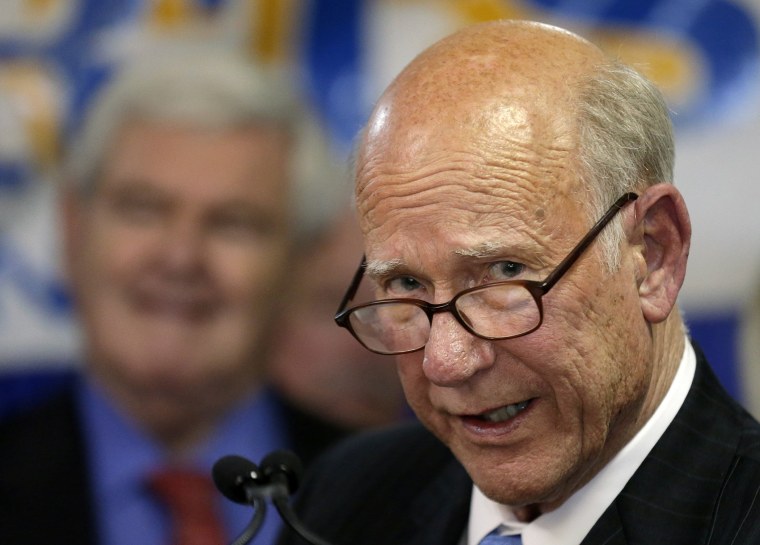At first blush, the dynamic is completely counter-intuitive: a competitive statewide election in which Democratic odds of success improve when there's no Democratic candidate. It happened in 2012 in Vermont's U.S. Senate race; it happened this week in Alaska's gubernatorial race.
And as of late yesterday, the same dynamic is now unfolding in Kansas' U.S. Senate race.
Democratic nominee Chad Taylor has withdrawn from the Kansas Senate race, setting up a competitive race between longtime Republican Sen. Pat Roberts and independent candidate Greg Orman. Normally, a Democratic nominee dropping out in September would be a disaster for national Democrats. Paradoxically, Taylor's withdrawal gives the party a significant boost in their effort to retain control of the Senate in the upcoming midterm elections.
To appreciate why, consider our coverage from last week. Pat Roberts (R), who's been in Congress for over three decades, who no longer owns a home in the state he represents, and who struggled in a recent primary against a political novice, is clearly vulnerable. But recent polling has nevertheless shown the incumbent senator with a modest lead, largely because Taylor (D) and Orman (I) have split Roberts' opponents.
Just before yesterday's legal deadline, however, Taylor "terminated" his campaign, creating what is effectively a two-person race, pitting an increasingly popular independent against an increasingly unpopular Republican.
Kansas may be a ruby-red state, but there's ample evidence that Roberts' re-election is very much in doubt. And with control of the Senate on the line, yesterday's news out of Kansas may ultimately help dictate which party is in control of Congress' upper chamber in 2015 and 2016.
There are, of course, plenty of unanswered questions.
For one thing, Taylor insisted he would stay in this race for the long haul, despite the fact that Kansas hasn't elected a Democratic senator since FDR was in the White House. What changed his mind? Details are elusive, but msnbc's Kasie Hunt is reporting that Sen. Claire McCaskill (D), from the neighboring state of Missouri, was likely involved in the discussions.
For another, let's say for the sake of conversation that Orman's independent campaign thrives in the wake of Taylor's withdrawal. Does this mean he'll caucus with Democrats, just as the Senate's other two independents do? That's a surprisingly difficult question to answer.
In fact, Orman sat down with msnbc's Steve Kornacki last month to discuss his future and the Kansan carefully dodged every question along these lines. Other evidence offers few clues -- Orman voted for Obama in 2008 and Romney in 2012. In recent cycles, he's contributed financially to candidates in both parties. He's been registered as a Democrat and registered as a Republican.
That said, for Democrats on the national level, pushing Taylor aside and taking a chance on Orman is worth the risk. If he wins, maybe the Independent would caucus with Democrats; maybe he'd caucus with Republicans and be willing to work with Democrats on some issues. Either way, Orman would be a dramatic improvement over Pat Roberts, a doctrinaire Republican who goes along with his party on practically everything and has shown no interest in bipartisan legislating.
As for Kansas, as 2014 got underway, few expected the state to be in the electoral spotlight this year. But with Gov. Sam Brownback (R) in deep trouble in his re-election bid, and Pat Roberts' career suddenly in jeopardy, one of the nation's most reliably Republican states is suddenly one of the most important battlegrounds in the country.
